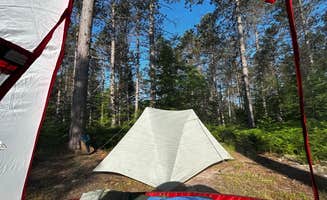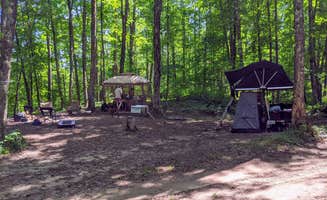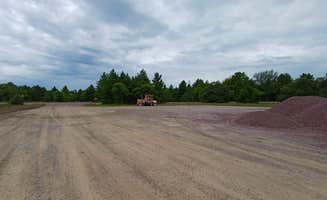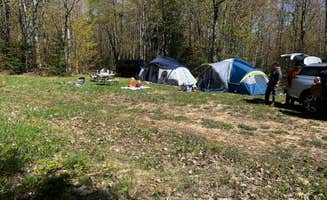Dispersed camping near Deerton, Michigan offers primitive accommodations in the Ottawa National Forest and Hiawatha National Forest. Situated at approximately 700 feet above sea level, the area experiences heavy lake effect snow in winter and humid summers with frequent thunderstorms. Forest roads throughout the region become impassable during spring thaw, typically from late March through early May.
What to do
Wildlife viewing opportunities: At Ironjaw Lake Dispersed Campsite, the position between two lakes creates excellent wildlife habitat. "We did have to clear a bunch of down trees to get down the road but we had the site and the lakes to ourselves. It was gorgeous," notes camper Willow M., who visited during the pre-season period.
Kayaking on secluded lakes: Herman Lake offers paddling opportunities away from crowds. Access requires navigation of challenging forest roads. According to a visitor, "We were able to kayak and it was beautiful and very private," though they caution about road conditions after rain.
Wildflower identification: The forest clearings near Adams Trail Dirt Lot showcase seasonal blooms. "Very quiet and peaceful, beautiful flowers everywhere," reports Laura M., who stayed overnight in August. This area serves primarily as a snowmobile staging area in winter but functions as informal camping during summer.
What campers like
Seclusion and privacy: The remoteness of Hickey Marsh Dispersed Camping appeals to those seeking solitude. Hunter W. found it "quiet especially in early May," while another camper noted only "1 car drive by in 2 days" during their stay.
Cell service availability: Connectivity varies dramatically between sites. At Hickey Marsh, campers report "cell service with Verizon was shockingly good" and "T-Mobile cell services was very good." This contrasts with Adams Trail Dirt Lot, where visitors experienced no service for major carriers.
Lake Superior proximity: Though beachfront camping options have become limited due to regulation changes, several sites provide access points for day use of Lake Superior beaches. Proximity to water draws many visitors to this region, with sites between inland lakes particularly valued.
What you should know
Site availability and regulations: Forest Service regulations change frequently. According to recent visitors at Lake Superior Beachfront, "There is signs posted just about everywhere 'no camping or overnight parking' don't waste your time." Always check current regulations before planning overnight stays.
Navigation challenges: Many campers report difficulty locating sites. One Ironjaw Lake visitor recommends "your best directions will come from locating the site on your GPS and dropping a pin. That took us straight to the location no problem."
Insect protection: Mosquitoes present significant challenges throughout the camping season. Amy Y. warns that at Hickey Marsh "the mosquitoes were pretty bad when we visited." Campers visiting Coalwood Trail noted "tons of mosquitoes right next to a small danky pond."
Tips for camping with families
Vehicle considerations: For family camping with children, choose sites with reliable access. Dispersed Camping Hovey Lake Equine Trailhead offers drive-in access with toilet facilities, minimizing logistics challenges for groups with children.
Safety planning: Forest roads throughout the region lack cell service. Families should bring paper maps, compass, and GPS units with preloaded coordinates. Multiple campers emphasize the importance of dropping GPS pins rather than relying on written directions.
Water sources: No reliable drinking water exists at dispersed sites. Families must transport all drinking water or bring filtration systems for lake water. Calculate 1 gallon per person per day minimum when planning water needs.
Tips from RVers
Size limitations: Most dispersed sites accommodate smaller trailers only. At Hickey Marsh Dispersed Camping, Tim reports "We were able to back our 26 foot travel trailer in and stay hooked up to it," but warns about limited turning space.
Road condition assessment: One Herman Lake visitor with a 21-foot travel trailer warns, "We do not recommend towing down this road," describing "deeply rutted and muddy one lane road in for about 1.5-2 miles." Consider scouting roads before attempting access with trailers.
Overnight options for larger vehicles: Adams Trail Dirt Lot serves as a practical stopover for larger rigs. Laura M. notes it's a "large, flat, dirt parking lot" where her "26ft motorhome" had no issues and found "easy turnaround for larger rigs."





